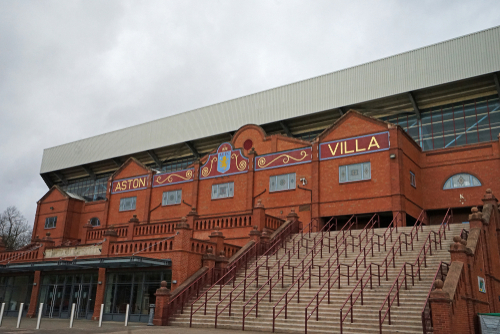- Ticket2.com /
- magazine /
- Article /

Villa Park - With a capacity of over 42,000 spectators
In the district of Aston in Birmingham, we find an iconic stadium named Villa Park.
Villa Park is one of England's most iconic football stadiums, located in the Aston area of Birmingham. Home to Aston Villa FC since 1897, this stadium has not only been a place for passionate football but also an important part of Birmingham's culture and history. With a capacity of over 42,000 spectators, Villa Park is one of the largest football stadiums in England and has hosted many memorable matches and events over the years.
The history of Villa Park dates back to the late 19th century when Aston Villa FC moved from their previous home ground, Perry Barr, to its current location. The first match was played on April 17, 1897, and the stadium has since undergone several renovations and expansions to meet the demands of modern football. One of the most notable periods in Villa Park's history was during the 1980s when Aston Villa won both the English league title and the European Cup. The stadium has also been a regular venue for FA Cup semifinals and has hosted several international matches, including during the World Cup in 1966 and the European Championships in 1996.
Architecture and Design
Villa Park is known for its classic British stadium design with four distinct stands: Holte End, North Stand, Trinity Road Stand, and Doug Ellis Stand. Holte End, which is one of the largest single-tier stands in England, is particularly known for its intense atmosphere and devoted supporters. Trinity Road Stand is perhaps the most architecturally impressive, with its modern facilities and excellent views of the pitch.
Atmosphere and Supporters
The atmosphere at Villa Park is electric, thanks to Aston Villa's passionate supporters. The club has a long tradition of loyalty and community, which is reflected in the support the team receives, regardless of performance on the pitch. Match days at Villa Park are an experience that combines excitement, history, and a deep sense of belonging.
Modern Development and Future
In recent years, Villa Park has undergone further modernization to enhance the experience for both players and fans. With investments in facilities, including improved seating comfort and new digital screens, the stadium strives to remain at the forefront of the football world. Aston Villa's return to the Premier League has also meant that the interest in the stadium and club is higher than ever.
Significance for the Community
Villa Park is more than just a football stadium; it is a vital hub for the local community in Birmingham. The stadium is used for a variety of events beyond football, including concerts, conferences, and other sporting events. Aston Villa FC also engages in several community projects and initiatives, making Villa Park a central part of the city's social and cultural life.
Summary
Villa Park stands as a monument to English football history and cultural significance. From its roots in the 19th century to its modern facilities today, the stadium has witnessed countless historic moments and is a symbol of the passion and dedication of Aston Villa and its supporters. With a rich history and a bright future, Villa Park continues to be a place where memories are made and dreams are fulfilled.
Read more about Aston Villa here
Back to Articles

